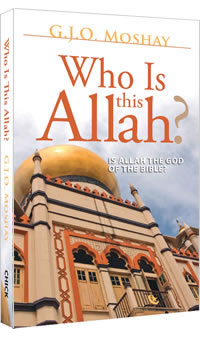Islam's Hadith Describes A Capricious God and a Perverse Prophet
- Issue Date: July/August 1993
If Allah is God (as some Christians claim) and Muhammad is his apostle (as Muslims claim) then whatever Muhammad says must be true.
But what if some of Muhammad's sayings are so outlandish and absurd that they cannot possibly be true? Does this not destroy the claim of 1 billion followers that Muhammad is a true prophet of the living God?
Consider, this for instance, Muhammad claims that Adam was approximately 90 feet tall. Or that the angel Gabriel has 600 wings. Or that "Satan stays in the upper part of the nose all night" and has to be flushed out with water in the morning.
Although these absurdities are not in the Quran, they appear in the Hadith, a nine-volume "...collection of early Muslim traditions which record the words and deeds of Muhammad according to his wives, family members, friends and Muslim leaders," says Robert Morey in his book, Islamic Invasion.
Similar to the body of traditions which Roman Catholicism considers equal to the Bible, the Hadith is the source of much of the day-to-day practices taught to Muslims.
What Must I Do to be Forgiven by Allah?
Of specific interest to soul winners is the central question of the Hadith: "What must I do to be forgiven by Allah and to be admitted to paradise?"
Throughout the Hadith is the basic assumption that no one goes to paradise without Allah's forgiveness. But the Bible and the Quran present two vastly different ways to obtain forgiveness. And the primary difference is in the personality of the deity who is doing the forgiving.
The God of the Bible is a stable, gracious, loving, personal God who delights in being involved with His creation. Those who come to Him, He receives as dear children into the family of God. They are freely forgiven their transgressions and personally nurtured by the Holy Spirit as they strive to please their loving heavenly Father.
Allah, on the other hand, is capricious and aloof, refusing to even admit to being a spirit, much less considering being born as a man to redeem his creatures.
One Mistake Cancels All Good That's Done
He demands good works to get his forgiveness, and to keep it, one must follow elaborate rituals and rules of living. But one mistake can cancel out all the good you have accumulated up to that point. And the Muslim is never really sure he has measured up and will go to paradise.
Another benefit of the Hadith is a more detailed look at Muhammad himself. If he is Allah's apostle as Muslims claim, his personality and character are of vital concern. Muslims find they must follow the example of a man who was a short tempered, arrogant slave owner who called black people "raisin heads." He also appears as a vengeful, bitter man "who had numerous people murdered when they got on his bad side," says Morey.
In contrast to our sinless Lord Jesus, the many Hadith verses show Muhammad as a sinner in need of forgiveness. Hadith no. 319, vol. 8 quotes Muhammad: "By Allah! I ask for forgiveness from Allah and turn to him in repentance more than seventy times a day." Yet, many modern followers of Muhammad will claim that Muhammad was sinless.
Muhammad's sexual appetite is the subject of several of the Hadith verses. Besides a harem of over 20 women, he would pick and choose among the captured slave girls, giving them to his friends if they were not beautiful enough. The Hadith makes the claim that he was able to have sex with all of them (his 16 wives, 2 concubines and 4 slaves) every day before prayers."
The Hadith quotes his friends bragging that he "was given the strength of 30 men" (vol. 1, no. 268). This claim was probably made to impress the Arabs who believed that heaven was a place of free flowing wine and ceaseless sexual ecstacy.
Other sections of the Hadith deal with Muhammad's "seal of prophethood," a fatty lump growing between his shoulders; his prowess as a shaman who controlled the jinn (spirits) who lived in the rocks and trees; his epileptic type seizures when he had a "revelation."
Fanciful miracles are also attributed to Muhammad in the Hadith. To prove he was Allah's prophet, he once supposedly cut the moon in half with his sword, calmed a crying baby palm tree by caressing its trunk, caused water to flow from his fingernails to slack the thirst of his followers and ate shouting bread which loudly praised Allah while he chewed.
Fastest Growing Religion in the West
Islam is one of the fastest growing movements in the Western World. Yet few who convert to that religion realize the perversity of some of its teachings. Morey says, "To the Western mind, the material found in the Hadith is the proverbial final straw that breaks the camel's back!
"If Muhammad was truly a prophet and an apostle, then Muslims must defend the indefensible." Many Muslims who are uncomfortable with these statements will claim that the translation from the original Arabic is flawed. However, the translation which Morey quotes is by Sahih Al-Bukhari and is "...approved by all Muslim authorities, including the spiritual heads of Mecca and Medina."
Western Bible believers should quickly expand their knowledge of this monstrous religious system which claims nearly 1 billion followers. Islam's loveless, capricious 7th-century moon god must be met with the powerful love and dignity of the gospel of Jesus Christ. Along with Roman Catholicism, two-fifths of the world's people are following a false christ or a false prophet.
We must go in the power of the Spirit of the true God and lay the Bible before them and challenge them to place their pagan-based traditions beside it and see which will stand close scrutiny. Then we must invite them to obtain forgiveness through the blood of our caring Saviour and become a dear child in the Family of God.
- See more articles on related topics:
- False Religions
- Islam
- Qur`an / Hadith
- Allah vs Biblical God
- Who Was Muhammad?
- Islamic Teachings
Other Articles from July/August 1993:
More on Islam:
Products of Interest:
-

Who Is This Allah?
256 pages
Islam is a religion without redemption, because it has a god who does not love mankind. Moshay PROVES that Allah and the God of the Bible are not the same. -

Anatomy of the Qur'an
160 pages
The Qur’an is a disorganized mass of contradictions, historical blunders, misunderstandings of the Bible, and folk tales. See how it compares to the Bible. 
Is Allah Like You?
A Muslim family finds the God of creation in the Prophet Jesus.-

Prophet, The
32-PAGE, FULL COLOR COMIC BOOK - Alberto Series Part 7 - Learn how the papacy helped start Islam, only to have this new daughter rebel against her. You will understand the Arab’s place in Bible prophecy.



